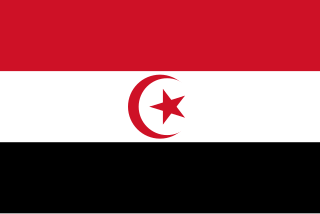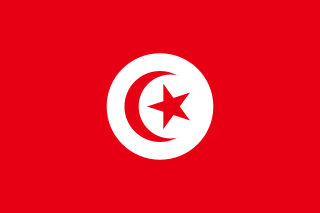Related Research Articles

Habib Bourguiba was a Tunisian lawyer, nationalist leader and statesman who led the country from 1956 to 1987 as the prime minister of the Kingdom of Tunisia (1956–57) then as the first president of Tunisia (1957–87). Prior to his presidency, he led the nation to independence from France, ending the 75-year-old protectorate and earning the title of "Supreme Combatant".

Popular Unity Movement, is a socialist political party in Tunisia.

The Arab Islamic Republic was a proposed unification of Tunisia and Libya in 1974, agreed upon by Libyan head of state Muammar Gaddafi and Tunisian President Habib Bourguiba. Additional countries—Morocco and Algeria—were later included in the proposal, which was never implemented.

Rachid Sfar, the former Prime Minister of Tunisian President Habib Bourguiba, was born on September 11, 1933 in Mahdia, the ancient Fatimite capital of Tunisia. He is the son of the Destourian leader Tahar Sfar, an associate of Bourguiba and co-founder of the Neo-Destourian Tunisian Nationalist Party in 1934. Sfar's ancestors were among the first people of Turkish origin to arrive in Tunisia during the Ottoman rule, they had arrived from Anatolia and Macedonia.

The process of Tunisian Independence occurred from 1952 to 1956 between France and a separatist movement led by Habib Bourguiba. Bourguiba became the first Prime Minister of the Kingdom of Tunisia after negotiations with France successfully brought an end to the colonial protectorate leading to independence.

Menzel Bourguiba, formerly known as Ferryville, is a town located in the extreme north of Tunisia, about 60 kilometres (37 mi) from Tunis, in the Bizerte Governorate.

Mohammed Mzali was a Tunisian politician who served as Prime Minister between 1980 and 1986.
The Socialist Destourian Party was the ruling political party of Tunisia from 1964 to 1988. Bahi Ladgham was the first Prime Minister from the party and Hédi Baccouche was the last. It was founded on 22 October 1964 and disbanded on 27 February 1988. Habib Bourgiba was the first president of the Socialist Destourian Party from 1964 to 1987. He was succeeded by Zine El Abidine Ben Ali from 1987 to 1988.
The New Constitutional Liberal Party, most commonly known as Neo Destour, was a Tunisian political party founded in 1934 by a group of Tunisian nationalist politicians during the French protectorate. It originated from a split with the Destour party.
The Third Tunisia Plan was an economic development plan implemented by the government of President Habib Bourguiba from 1969 to 1972.
The Sixth Tunisia Plan was an economic development plan implemented by the government of President Habib Bourguiba from 1982 to 1986.
The Second Tunisia Plan was an economic development plan implemented by the government of President Habib Bourguiba from 1965 to 1968.

Stade Africain de Menzel Bourguiba, often referred to as SAMB is a football club from Menzel Bourguiba in Tunisia. Founded in 1938, the team plays in green and white colors. Their ground is the Stade Municipal de Menzel Bourguiba, which has a capacity of 6,500.
In its modern history, Tunisia is a sovereign republic, officially called the Republic of Tunisia. Tunisia has over ten million citizens, almost all of Arab-Berber descent. The Mediterranean Sea is to the north and east, Libya to the southeast, and Algeria to the west. Tunis is the capital and the largest city ; it is located near the ancient site of the city of Carthage.

Moufida Bourguiba was the first wife of the President of Tunisia, Habib Bourguiba, and the inaugural First Lady of Tunisia from 1957 to 1961.

Carthage Palace, is the presidential palace of Tunisia, and the official residence and seat of the President of Tunisia. It is located along the Mediterranean Sea at the current city of Carthage, near the archaeological site of the ancient city, fifteen kilometers from Tunis. A house by Le Corbusier sits within the site.

Tahar Ben Ammar was a Tunisian politician.

Mohamed Beji Caid Essebsi was a Tunisian statesman who was the president of Tunisia from 31 December 2014 until his death on 25 July 2019. Previously, he served as the minister of Foreign Affairs from 1981 to 1986 and as the prime minister from February 2011 to December 2011.

The Kingdom of Tunisia was a short-lived kingdom established on 20 March 1956 after the Tunisian independence and lasted until the declaration of the republic on 25 July 1957.

Salah Ben Youssef was a Tunisian politician and one of the key leaders of the Tunisian national movement.